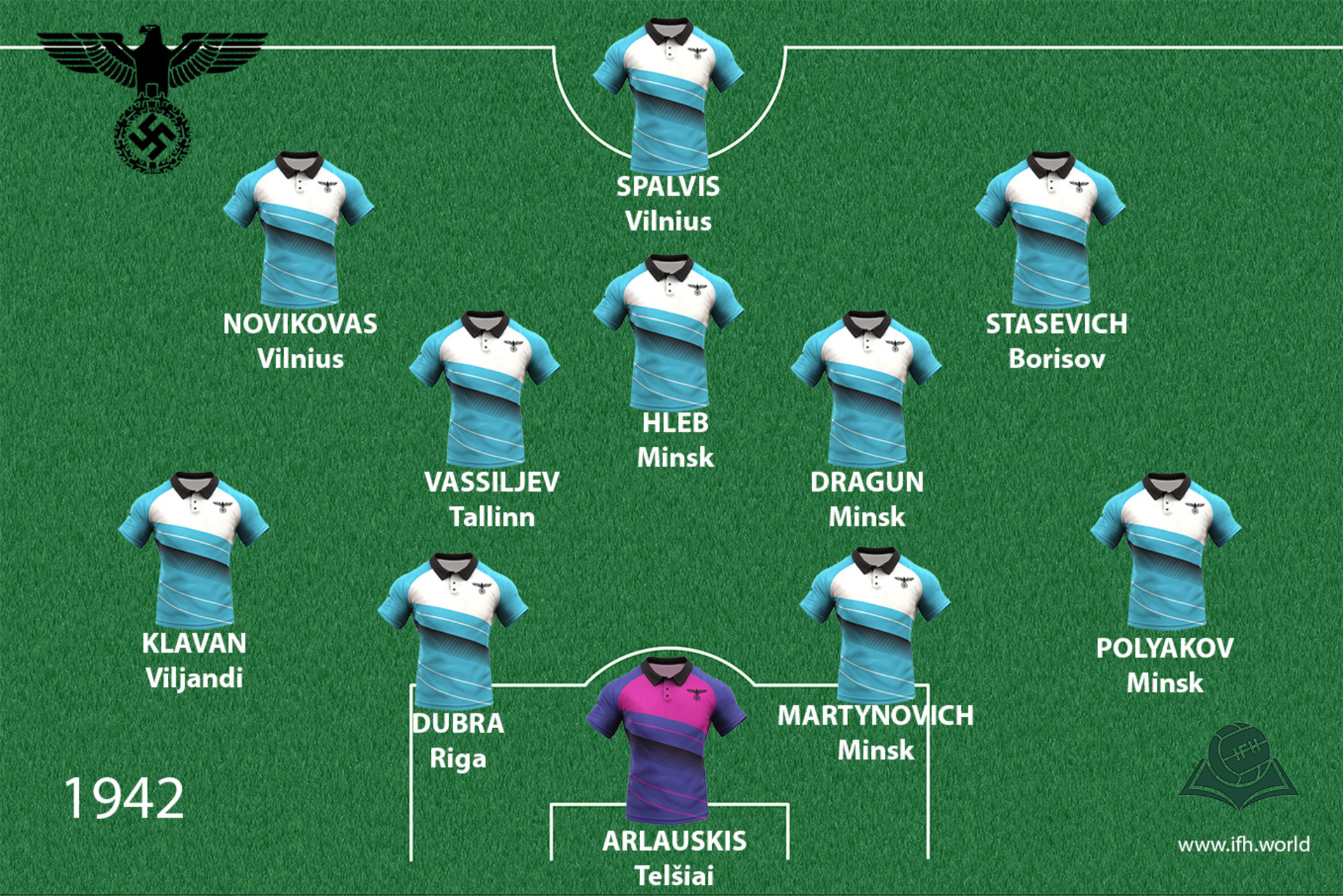Reichskommissariat Ostland
Reichskommissariat Ostland (RKO) covered the Baltic states (Lithuania, Latvia, and Estonia) and parts of western Belorussia and was one of two major administrative units in the German civil administration that controlled the occupied territories of the Soviet Union during World War II. With the creation of Ostland the Nazis got their opportunity to put previously devised theories into practice, before all – the Lebensraum.

Coat of arms
Shirt
| Position | First name | Last name | Mjesto rođenja | Like | Dislike |
|---|
The Baltic states retained independence as long as Germany and Russia remained weak or antagonistic. After German-Soviet Nonaggression Pact (1939) and Partition of Poland they were annexed by USSR. However, the strong anti-Russian and anti-communist sentiment, as well as Stalinist deportation, have influenced to the Baltics view on Germans - after its attack on the USSR in 1941–as the liberators. Nevertheless, Germans did not have the intention to give them autonomy or restore their independence from the interwar period. [1]
They turned the Baltic states and parts of soviet Belorus into a new territorial unit, Ostland which was divided into four "General Commissariats''. Indigenous but virtually powerless local administrations were set up in each of the Baltic countries.[2] Ostland was governed by Reich Commissioner Heinrich Lohse, technically a subordinate of Alfred Rosenberg (Baltic German born in Tallin) and his ministry for occupied Eastern territories.[3]
In Nazi utopian plan - appear in German intellectual circles at the turn of the century – the Eastern Europe supposed to be colonized, ie. They need to create "Lebensraum" for Germans, or for ethnic Germans from Eastern Europe (Volksdeutschers), the Netherlands , Norwegians, Danes, etc. [4] In Nazi ideology the Slavs are a mass of born slaves, who feel the need of a master.[5] They considered them to be members of the lower race for which they would develop plans for "passive extermination" by hunger, cold and enslavement in the form of slave service in mines and fields. [6]
Germanization, according to volkisch nationalism, must be primarily "linked with the soil" and not with people. Negroes and Chinese are capable of learning how to speak German fluently, but they will never actually become Germans. But Hitler regarded the Balts as being essentially close to the master race. He stated that under German rulers and by infusion of German blood, the Baltic countries would have turned prosperous. Because of Polish influence in the past the Lithuanians were ranked lowest as prospects for Germanization in comparison to the Latvians and Estonians.[7] The Jews living in the RKO were exterminated by the mobile killing units along with members of the SIPO, SD, and local collaborators.[8]
In generally, German occupation of Eastern Europe was a form of colonial rule. Colonialism, which had very positive connotations at the time, offered the Nazi perpetrators the possibility of exculpating themselves and obscuring the enormity of their own crimes. There were several parallels between German plans and the colonial empires of history and they are not limited to ideological justifications of rule and conquest. National Socialists saw the East as a huge tabula rasa that had to be developed according to their ideas. Parallels with colonialism are also evident in the methods employed by rulers. In the colonies, a small elite of colonial administrators and officers ruled over a much larger indigenous population that barely participated in governance and the colonizers and the colonized belonged to different, racialized legal systems. Executions of prisoners and mass murder through hunger, disease and dehydration also occurred during colonial wars. Like colonist, Germans denied the enemy the status of a legitimate and equal opponent. The ‘natives’ of Eastern Europe were socially and legally separate from the Germans. However, their contributions as workers integrated them into the Third Reich’s economy and guaranteed their right to life.[9]
- [1] JULIUS P. SLAVENAS, NAZI IDEOLOGY AND POLICY IN THE BALTIC STATES, State University of New York, College at Buffalo, http://www.lituanus.org/1965/65_1_03_Slavenas.html
- [2] ''Baltic states. Independence and the 20th century'', https://www.britannica.com/place/Baltic-states/Independence-and-the-20th-century#ref418696
- [3] JULIUS P. SLAVENAS, NAZI IDEOLOGY AND POLICY IN THE BALTIC STATES, State University of New York, College at Buffalo, http://www.lituanus.org/1965/65_1_03_Slavenas.html
- [4] Michael BURLEIGH, Treći Reich : nova povijest, Zaprešić, 2012., 664
- [5] JURGEN ZIMMERER, The birth of the Ostland out of the spirit of colonialism: a postcolonial perspective on the Nazi policy of conquest and extermination, Patterns of Prejudice, Vol. 39, No. 2, 2005., 205
- [6] Grupa autora, Povijest: Predvečerje rata i Drugi svjetski rat (1936. - 1945.) , knjiga XVII., Zagreb 2008., 27
- [7] JULIUS P. SLAVENAS, NAZI IDEOLOGY AND POLICY IN THE BALTIC STATES, State University of New York, College at Buffalo, http://www.lituanus.org/1965/65_1_03_Slavenas.html
- [8] ''Reichskommissariat Ostland'' https://www.yadvashem.org/untoldstories/documents/GenBack/Reichskommissariat_Ostland.pdf
- [9] JURGEN ZIMMERER, The birth of the Ostland out of the spirit of colonialism: a postcolonial perspective on the Nazi policy of conquest and extermination, Patterns of Prejudice, Vol. 39, No. 2, 2005., 197, 201, 204, 206, 208
Sources
- Georges BENSOUSSAN, Europska strast za genocidom : povijest genocidnih ideja i djela, Zagreb, 2010.
- Michael BURLEIGH, Treći Reich : nova povijest, Zaprešić, 2012.
- Grupa autora, Povijest: Predvečerje rata i Drugi svjetski rat (1936. - 1945.) , knjiga XVII., Zagreb 2008.
- JULIUS P. SLAVENAS, NAZI IDEOLOGY AND POLICY IN THE BALTIC STATES, State University of New York, College at Buffalo, http://www.lituanus.org/1965/65_1_03_Slavenas.html
- JURGEN ZIMMERER, The birth of the Ostland out of the spirit of colonialism: a postcolonial perspective on the Nazi policy of conquest and extermination, Patterns of Prejudice, Vol. 39, No. 2, 2005.
- ''Reichskommissariat Ostland'', https://www.yadvashem.org/untoldstories/documents/GenBack/Reichskommissariat_Ostland.pdf
